
Journal of Energy Storage
Scope & Guideline
Exploring breakthroughs in energy management.
Introduction
Aims and Scopes
- Energy Storage Technologies:
The journal covers a wide range of energy storage technologies, including batteries, supercapacitors, phase change materials, and thermal energy storage systems, emphasizing their design, performance, and applications. - Materials Science and Nanotechnology:
Research on novel materials for energy storage applications, including nanostructured materials, metal-organic frameworks, and biomass-derived carbons, is a core focus, highlighting their synthesis, characterization, and electrochemical performance. - Modeling and Simulation:
The journal encourages contributions that utilize modeling and simulation techniques to predict and analyze the behavior of energy storage systems, including thermal management, charge-discharge cycles, and system optimization. - Sustainability and Environmental Impact:
Research addressing the sustainability of energy storage technologies, including life cycle assessments, techno-economic analyses, and the recycling of materials, is emphasized to support the transition to a greener energy landscape. - Integration with Renewable Energy Sources:
The journal explores the integration of energy storage systems with renewable energy sources, focusing on grid stability, energy management strategies, and the role of energy storage in enhancing the reliability of renewable energy systems.
Trending and Emerging
- Hybrid Energy Storage Systems:
There is an increasing focus on hybrid energy storage systems that combine various technologies, such as batteries, supercapacitors, and thermal storage, to optimize performance and efficiency in energy management. - Advanced Materials for Energy Storage:
Research on advanced materials, such as MXenes, metal-organic frameworks, and nanostructured composites, is trending as they offer enhanced electrochemical performance and stability for next-generation energy storage devices. - Machine Learning and Artificial Intelligence Applications:
The application of machine learning and artificial intelligence in predicting battery performance, optimizing energy management strategies, and enhancing system reliability is gaining momentum, reflecting the growing intersection of energy storage and data science. - Sustainable and Eco-Friendly Solutions:
There is a notable rise in research focused on sustainable materials and methods for energy storage, including the use of biowaste, eco-friendly electrolytes, and the recycling of battery components to minimize environmental impact. - Integration with Smart Grids and Energy Management Systems:
The trend towards integrating energy storage systems with smart grid technologies and advanced energy management systems is emerging, highlighting the need for intelligent solutions that can adapt to fluctuating energy demands.
Declining or Waning
- Conventional Battery Technologies:
Research related to traditional lead-acid and nickel-cadmium batteries has decreased in favor of more advanced technologies such as lithium-ion, sodium-ion, and solid-state batteries. - Single-Function Energy Storage Systems:
There is a noticeable decline in studies focusing solely on single-function energy storage systems, as researchers are increasingly looking at hybrid systems that combine multiple energy storage technologies for improved performance. - Static Thermal Energy Storage Solutions:
Research on static thermal energy storage solutions without dynamic integration or active control strategies is less prevalent, as the focus shifts towards optimizing systems that can respond to variable energy demands.
Similar Journals

Battery Energy
Leading the Charge in Battery Energy Research.Battery Energy is a pioneering open-access journal established by Wiley in 2022, dedicated to the dynamic field of energy storage and battery technologies. With an E-ISSN of 2768-1696, this journal plays a pivotal role in disseminating innovative research and advancements pertinent to the energy sector, including renewable energy solutions and sustainability practices. It holds a respectable position in Scopus rankings, being placed 32nd out of 78 in the Energy category and 130th out of 270 in Renewable Energy, Sustainability, and the Environment, showcasing its growing impact within the academic community. The journal aims to provide an inclusive platform for researchers, professionals, and students to share insights, foster collaboration, and tackle the pressing challenges associated with battery energy storage. By promoting open access, Battery Energy ensures that cutting-edge research is readily available to a global audience, facilitating the continued evolution of battery technologies for a sustainable future.

Advanced Energy and Sustainability Research
Elevating Knowledge in Energy and Environmental ChallengesAdvanced Energy and Sustainability Research is a leading open-access journal published by WILEY since 2020, dedicated to advancing knowledge and understanding in the realms of energy and sustainability. With an impressive impact factor and a commitment to high-quality, peer-reviewed research, this journal serves an international audience of researchers, professionals, and students passionate about addressing critical environmental challenges. The journal encompasses a wide array of topics within environmental science and energy fields, securing notable rankings in Scopus with top percentiles across several categories, including Ecology, Energy Engineering and Power Technology, and Waste Management. Given its open-access model, Advanced Energy and Sustainability Research facilitates the dissemination of cutting-edge research, enhancing accessibility and fostering collaboration within the scientific community. This journal not only plays a pivotal role in shaping public policy and industry practices but also aims to inspire innovative solutions for sustainable development in an increasingly complex world.

Frontiers in Energy
Advancing Knowledge in Energy Systems for a Sustainable World.Frontiers in Energy is a distinguished journal published by HIGHER EDUCATION PRESS, focusing on the dynamic and rapidly evolving field of energy engineering and power technology. Established in 2011, the journal serves as a pivotal platform for disseminating innovative research findings and practical applications that address critical challenges in energy systems. With an impressive Q2 ranking in 2023 and a Scopus rank of 81 out of 272 in the discipline, it highlights the journal's influential impact within the academic community, reflecting its commitment to high-quality research. Based in Beijing, China, the journal aims to promote open and accessible scientific discussion, facilitating collaboration among researchers, professionals, and students alike. As an open access publication, Frontiers in Energy ensures that valuable knowledge is readily available to a global audience, effectively contributing to advancements in sustainable energy solutions. Join the forefront of energy innovation by engaging with cutting-edge research that shapes our energy future.
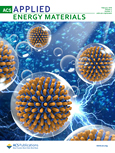
ACS Applied Energy Materials
Advancing Sustainable Solutions in Energy MaterialsACS Applied Energy Materials, published by the American Chemical Society, is a premier journal dedicated to the cutting-edge fields of energy materials, chemical engineering, and electrochemistry. With an impressive impact factor and consistently ranked in the Q1 category across multiple disciplines—including Chemical Engineering, Electrical and Electronic Engineering, and Materials Chemistry—this journal serves as a pivotal platform for researchers and professionals focused on innovative solutions for energy systems and materials science. Since its inception in 2018, ACS Applied Energy Materials has been committed to disseminating high-quality research that addresses pressing energy challenges, promoting sustainability and efficiency in various applications. Its competitive Scopus rankings reflect the journal's influence and relevance within the academic community, making it an essential resource for anyone looking to stay at the forefront of energy materials research.
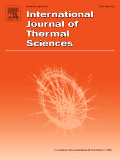
INTERNATIONAL JOURNAL OF THERMAL SCIENCES
Innovating research in thermodynamics and engineering.The INTERNATIONAL JOURNAL OF THERMAL SCIENCES is a premier academic journal published by ELSEVIER FRANCE-EDITIONS SCIENTIFIQUES MEDICALES ELSEVIER, focusing on cutting-edge research in the field of thermal sciences. With its ISSN 1290-0729 and E-ISSN 1778-4166, this journal has established itself as a crucial resource for scholars and professionals interested in the thermodynamic principles governing engineering and condensed matter physics. The journal is ranked Q1 in both Condensed Matter Physics and Engineering (miscellaneous), highlighting its exceptional quality and influence, as reflected in its impressive Scopus ranks: #32 out of 307 in General Engineering (89th percentile) and #57 out of 434 in Condensed Matter Physics (86th percentile). Researchers and students alike can benefit from the wealth of articles available, with access options designed to foster a wider dissemination of knowledge within the scientific community. Established in 1973 and ongoing through 2025, the journal invites contributions that advance the understanding of thermal phenomena and their applications, solidifying its importance in driving innovation and insight within these dynamic fields.
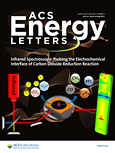
ACS Energy Letters
Transforming Energy Challenges into Innovative SolutionsACS Energy Letters, published by the American Chemical Society, is a prestigious peer-reviewed journal designed to disseminate innovative and impactful research in the multifaceted field of energy science. Since its inception in 2016, the journal has quickly ascended to a remarkable status, achieving Q1 rankings in critical categories including Chemistry (miscellaneous), Energy Engineering and Power Technology, Fuel Technology, Materials Chemistry, and Renewable Energy, Sustainability and the Environment as of 2023. With an emphasis on rigorous research methodologies and interdisciplinary collaboration, ACS Energy Letters serves as a vital platform for scholars, professionals, and students to explore cutting-edge research that addresses contemporary energy challenges. While maintaining a commitment to advancing knowledge without open access, it offers profound insights into sustainable practices and innovative solutions that are crucial for the future of energy systems globally. The journal's esteemed standing in the chemical and energy sectors underscores its significance, making it an essential resource for anyone invested in the advancement of energy technologies and sustainable practices.

Advances in Energy Research
Advancing Knowledge for a Greener Energy Future.Advances in Energy Research is a prominent journal dedicated to the exploration and advancement of energy technologies and sustainable practices. Published by TECHNO-PRESS, this journal serves as a vital platform for researchers, professionals, and students in the energy field, featuring innovative studies and reviews that contribute to the body of knowledge surrounding energy efficiency, renewable resources, and the integration of new technologies. The journal holds a significant position in energy research and aims to facilitate the dissemination of groundbreaking findings and ideas that are pivotal for the transition toward a more sustainable energy future. Located in South Korea, with an ISSN of 2287-6316, it embraces an open access philosophy that ensures widespread availability of its content, further enhancing its impact in the academic community.
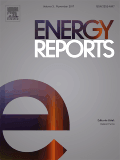
Energy Reports
Connecting Researchers to Transform Energy PracticesEnergy Reports, published by Elsevier, is a prestigious open access journal that serves as a vital resource in the field of energy research. Since its inception in 2015, this journal has swiftly ascended to become a key player in disseminating knowledge across various energy-related disciplines, evident from its impressive Q2 ranking in the miscellaneous category of Energy for 2023 and its notable position in the 78th percentile among over 70 journals in the general energy category, ranked 16th out of 73 on Scopus. Based in the United Kingdom, Energy Reports not only fosters innovative research but also promotes accessibility by providing open access to its articles, thereby ensuring that findings reach a global audience of researchers, professionals, and students. With a commitment to advancing sustainable energy solutions and technologies, Energy Reports plays a crucial role in shaping future energy policies and practices, making it an essential platform for scholarly communication in the ever-evolving landscape of energy research.

Solar Energy
Fostering excellence in solar energy research since 1957.Solar Energy is a premier academic journal published by PERGAMON-ELSEVIER SCIENCE LTD, focusing on the advancements and research in the field of solar energy technology, sustainability, and related sciences. With an ISSN of 0038-092X and E-ISSN 1471-1257, this influential journal has been at the forefront of renewable energy research since its inception in 1957, with a commitment to fostering scientific communication up to the year 2024. Recognized globally, it holds an impressive impact factor, ranking in the Q1 category in both Materials Science and Renewable Energy, Sustainability and the Environment, positioning it among the top journals in its field—ranked #50/463 in General Materials Science and #34/270 in Renewable Energy. The journal serves as a vital platform for researchers, professionals, and students, providing access to groundbreaking studies, innovative methodologies, and comprehensive reviews that advance the understanding and application of solar energy technologies. While the journal is not open access, its rigorous peer-review process ensures the publication of high-quality, impactful articles that are invaluable to the academic community striving to address global energy challenges.
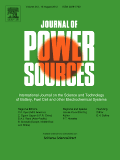
JOURNAL OF POWER SOURCES
Pioneering Research in Renewable and Traditional EnergyThe Journal of Power Sources is a premier multidisciplinary journal published by Elsevier, focusing on the advancement of technology and science in the field of power sources. Established in 1976, it showcases high-quality research spanning traditional and emerging technologies related to energy storage, conversion, and utilization. With a strong commitment to impact, this journal ranks in the Q1 quartile for several categories, including Electrical and Electronic Engineering, Energy Engineering and Power Technology, and Renewable Energy, Sustainability, and the Environment, reflecting its broad influence and esteemed contributions to the field. The journal is highly regarded within Scopus, holding impressive rankings such as Rank #33 in Electrical and Electronic Engineering and Rank #13 in Energy Engineering, among others, positioning it well within the scientific community. While the journal is not open access, it remains pivotal for professionals, researchers, and students seeking to stay at the forefront of developments in power sources. The continuity of its publication until 2024 further ensures that it will remain a key resource for innovative research and technological advancements in energy solutions.